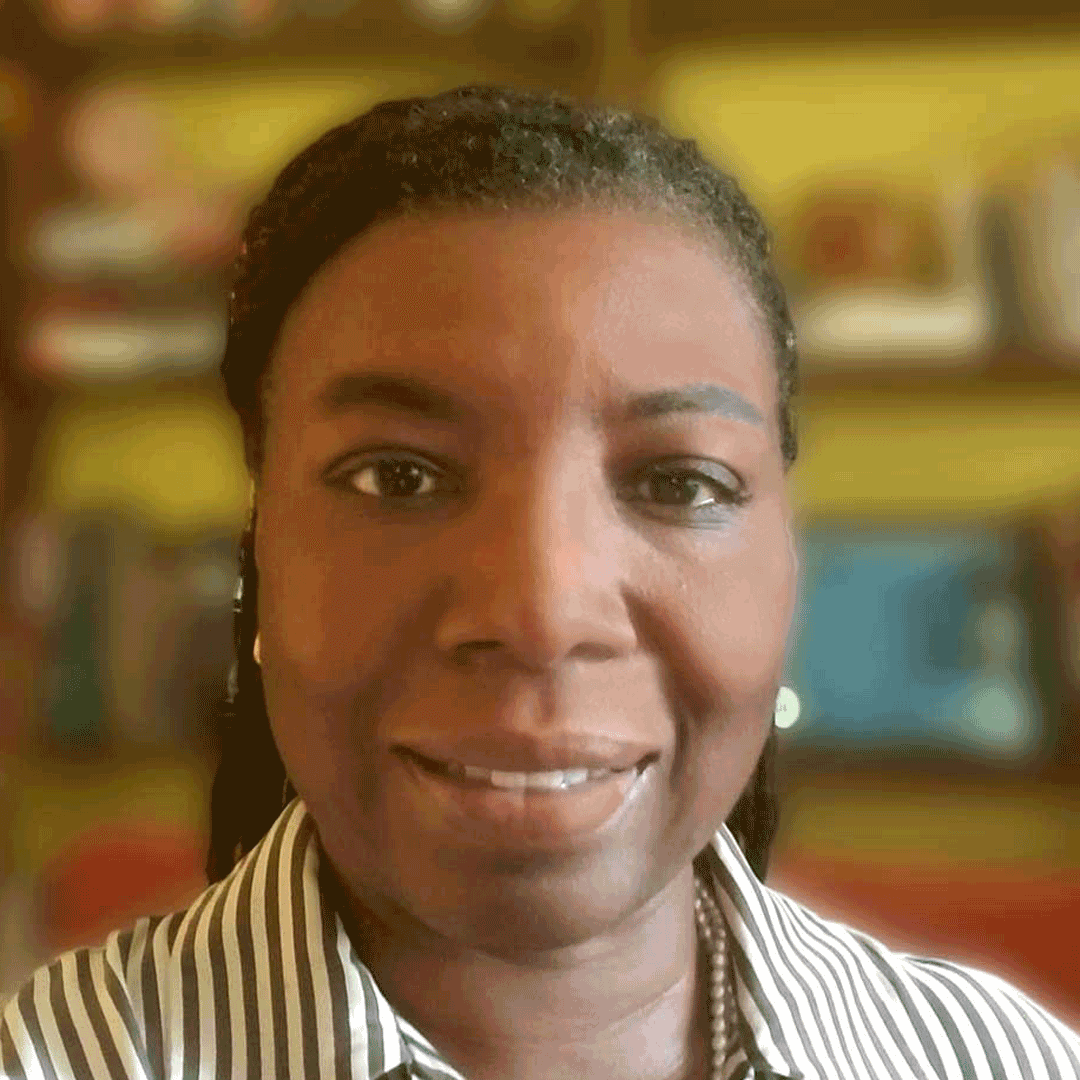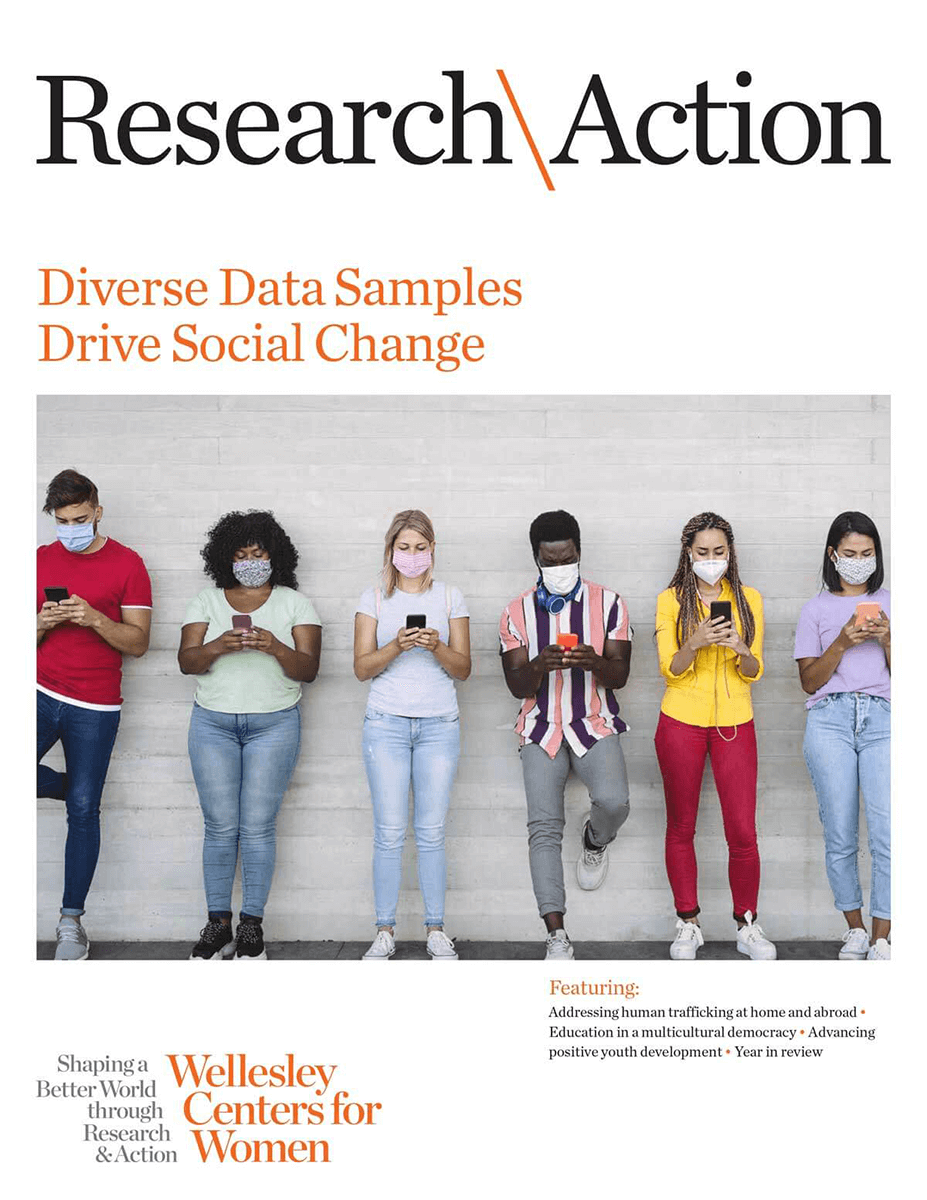 In the fall of 2021, Sheron Fraser-Burgess, Ph.D., a class of 1987 Wellesley College alumna, joined WCW as a visiting scholar from Ball State University. Over the course of this semester, she’ll explore how womanism—an intellectual, social, and cultural movement that grew out of Black women’s recognition of a culturally distinct approach to thinking about social problem solving—has evolved among Caribbean women in higher education in the last decade.
In the fall of 2021, Sheron Fraser-Burgess, Ph.D., a class of 1987 Wellesley College alumna, joined WCW as a visiting scholar from Ball State University. Over the course of this semester, she’ll explore how womanism—an intellectual, social, and cultural movement that grew out of Black women’s recognition of a culturally distinct approach to thinking about social problem solving—has evolved among Caribbean women in higher education in the last decade.
Tell us about your background.
My story begins with my parents, who were Jamaican immigrants to the United States and came of their own initiative to serve in Christian ministry in an African American community in Miami, Florida. There were difficult years, but my mother modeled discipline, love, and loyalty and they both prioritized our education. The decision to attend Wellesley College catapulted me into an environment that was the epitome of self-determination and immersed me in an academic culture that felt very comfortable—although it was a significant adjustment in so many other ways.
I returned to Miami after graduation to support my parents in their ministry and to teach high school English classes and middle school reading for the next eight years. Racial, social, and economic disparities were inescapable during that time in the late 1980s and early 1990s. It became clear to me that my way of making sense of the world was not adequate given my experiences. As an immigrant, I believed in fulfilling the American dream, and meritocracy was an essential tenet of that. But the families I knew seemed caught in a vicious cycle of disadvantage despite their aspirations and work ethic.
I eventually began a graduate program in philosophy at the University of Miami. A program in Western analytic philosophy may not have been the ideal place to acquire a critical understanding of institutionalized racism! However, being deeply immersed in the philosophical systems that are the foundations of Western/Eurocentric thought and the theories that have perpetuated racism over time showed the extent of their staying power and their role in perpetuating, as the eminent political theorist Charles Mills describes, the myth of white supremacy.
How have you combined philosophy and education in your current role?
As professor of social foundations of education and multicultural education, I teach undergraduate students who are teacher candidates about the ethical, socio-political, and historical implications of schools being nested within the broader U.S. society. I also teach ethics and philosophy of education for doctoral and master’s students to equip them to navigate their work as ethical agents. I get to create for my students the environment of critical thought and provide the theoretical and philosophical frameworks for analysis that were missing from my former interpretation of the world.
The question that has propelled my intellectual and academic journey since graduate school, and that has been refined since then, is: How should a multicultural democracy educate its children for pluralism?
Why is it important to view schools within a societal and cultural context?
The question that has propelled my intellectual and academic journey since graduate school, and that has been refined since then, is: How should a multicultural democracy educate its children for pluralism? Each of these terms has weighty ethical, political, and other philosophical commitments with which we must reckon that relate to viewing schools within a societal and cultural context.
Particularly in a democratic society, schools instrumentally have the obligation to prepare future citizens to help sustain a form of government that is, definitionally, by and for the people. The North American context, and particularly the United States, poses several challenges because of British colonialism that was succeeded by the march of empire and manifest destiny. Succeeding political regimes perpetuated chattel slavery and Native American genocide, settler colonialism, and economic imperialism. Fostering a critical civic literacy about this history of trouble and triumph is essential.
Tell us about your project working with social studies teachers to broaden their curricula.
The project, Anti-Racist Social Studies Curricula for Civic Engagement, was developed in 2020, after the racial reckoning that followed in the wake of George Floyd’s murder. African American community members and a school board representative partnered with Ball State University faculty to transform their public school social studies curricula from a Eurocentric/Anglo American focus.
The project, which is partially supported by the Library of Congress and its Teaching with Primary Sources grant, is a multi-year initiative within the local school district for grades 6-12 social studies teachers. It aims to deepen understanding of anti-racism and generate curricula and pedagogies that promote racial equality and civic engagement (participation in democracy) among students through using primary source documents.
In short, an anti-racist curriculum is a curriculum and pedagogy that promotes the critical civic literacy required to identify and understand racism in the past and present a) through the study of racially diverse people’s perspectives and experiences; and b) by promoting deep thinking about ways to dismantle racism through democratic processes, while promoting human rights.
How did you become interested in womanism, and how does it tie into your other work?
There is a chronological sequence here that relates to my own self and intellectual development as a scholar. I am very much a recovering traditional liberal democratic theory proponent. Despite knowing about the racism of the early architects of liberal democratic philosophy, I have been so enamored of their ideas about the inherent worth of human beings, which aligns with my faith and the idea of their being made in the image of God. The inconsistency between their ideals and flawed founding policies did not dislodge their prominence in my syllabi until I was gently challenged by two African American doctoral students, David Humphrey and Camea Davis. In addition to attending a conference on womanist theological ethics at Vanderbilt in 2017 and reading David Humphrey’s dissertation that interviewed self-identified womanists, it launched me on an intense journey of exploring the foundations and expansion of womanism as a system of thought by comparison. That led me then to WCW Executive Director Layli Maparyan’s two volumes, The Womanist Reader (2006) and The Womanist Idea (2012).
My recent womanist scholarship reflects my journey of engaging womanist thinking with traditional Eurocentric philosophical ideas of “modernity.”
As a scholar-activist, why is WCW's focus on research and action a natural fit for you?
It is a great fit because research, in its most formal sense, offers a best-known picture of the world and allows for the documentation of the status quo as well as ways to establish that interventions are working—that the problems that we identify are better because we acted.
How did your time as a student at Wellesley influence the direction of your career?
Wellesley inculcated a doctrine of self-determination alongside an unwavering commitment to service, “non ministrari sed ministrare.” I wrestled with reconciling these ideas for many years. While serving as a teacher and campus minister, it was difficult to feel that I was making a difference beyond the individual lives that I touched. I do still think that I am serving now, but through empowering others with the ways of thinking about their lives and those of others to contribute to affirming the significance and worth of each human being. In a democratic republic, teachers are some of the most influential and powerful citizens; equipping them to educate students to be contributing citizens is important work.
 Sheron Fraser-Burgess, Ph.D., is a scholar-activist and academic philosopher of education who studies the ethical, epistemological, and political implications of cultural identity and social positionality. She is a 1987 graduate of Wellesley College. Since 2005, she has been a Ball State University education professor for teacher candidates, administrators, and Ph.D. students.
Sheron Fraser-Burgess, Ph.D., is a scholar-activist and academic philosopher of education who studies the ethical, epistemological, and political implications of cultural identity and social positionality. She is a 1987 graduate of Wellesley College. Since 2005, she has been a Ball State University education professor for teacher candidates, administrators, and Ph.D. students.


